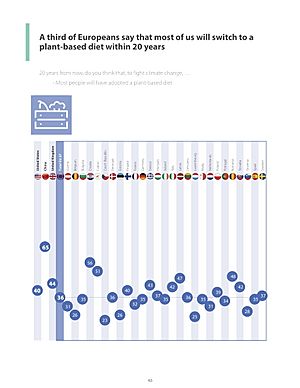Plant-based diet facts for kids
A plant-based diet is a diet consisting mostly or entirely of plant-based foods. Plant-based diets encompass a wide range of dietary patterns that contain low amounts of animal products and high amounts of plant products such as vegetables, fruits, whole grains, legumes, nuts and seeds. They do not need to be vegan or vegetarian but are defined in terms of low frequency of animal food consumption.
Terminology
Origin of the term "plant-based diet" is attributed to Cornell University nutritional biochemist T. Colin Campbell who presented his diet research at the US National Institutes of Health in 1980. Campbell's research about a plant-based diet extended from The China Project, a decade-long study of dietary practices in rural China, giving evidence that a diet low in animal protein and fat, and high in plant foods, could reduce the incidence of several diseases. In 2005, Campbell and his son published The China Study, a best-selling book emphasizing the potential health benefits of a plant-based diet. Campbell also used the plant-based concept to educate consumers about how eating meat had significant environmental consequences.
Some authors draw a distinction between diets that are "plant-based" or "plant-only". A plant-based diet may be defined as consuming plant-sourced foods that are minimally processed.
A review analyzing the use of the term plant-based diet in medical literature found that 50% of clinical trials use the term interchangeably with vegan, meaning that the interventional diet did not include foods of animal origin. 30% of studies included dairy products and 20% meat.
Motivation and prevalence
As of the early 21st century, some 4 billion people are estimated to live primarily on a plant-based diet, some by choice and some because of limits caused by shortages of crops, fresh water, and energy resources. Main motivations to follow a plant-based diet appear to be health aspirations, taste, animal welfare, environmental concern, and weight loss.
Sustainability
Biomass of mammals on Earth Livestock, mostly cattle and pigs (60%) Humans (36%) Wild mammals (4%)
The Food and Agriculture Organization defines a sustainable diet as one with "low environmental impacts which contribute to food and nutrition security, and to healthy life for present and future generations" and one that is affordable for all while optimizing both natural and human resources. A sustainable diet can be measured by its level of nutritional adequacy, environmental sustainability, cultural acceptability and affordability. Environmental sustainability can be measured by indicators of efficiency and environmental protection. Efficiency measures how much of a natural resource is required to produce a given amount of food. Environmental protection is the level of preservation of ecological systems.
Plant-based diets can contribute to reducing greenhouse gas emissions and the amount of land, water, and fertilizers used for agriculture. As a significant percentage of crops around the world are used to feed livestock rather than humans, eating less animal products helps to limit climate change and biodiversity loss. Especially beef, lamb and cheese have a very high carbon footprint. While soy cultivation is a "major driver of deforestation in the Amazon basin", the vast majority of soy crops are used for livestock consumption rather than human consumption. Adopting plant-based diets could also reduce the number of animals raised and killed for food on factory farms.

Research from 2019 on six diets found the plant-based diets more environmentally friendly than the diets higher in animal-sourced foods. Of the six mutually-exclusive diets; individuals eating vegan, vegetarian and pescetarian diets had lower dietary-carbon footprints than typical omnivorous diets, while those who ate 'paleolithic' and ketogenic diets had higher dietary-carbon emissions due to their animal sourced foods.
A 2020 study found that the climate change mitigation effects of shifting worldwide food production and consumption to plant-based diets, which are mainly composed of foods that require only a small fraction of the land and CO2 emissions required for meat and dairy, could offset CO2 emissions equal to those of past 9 to 16 years of fossil fuel emissions in nations that they grouped into 4 types. The researchers also provided a map of approximate regional opportunities.
According to a 2021 Chatham House report, supported by the United Nations Environment Programme, a shift to "predominantly plant-based diets" will be needed to reduce biodiversity loss and human impact on the environment. The report said that livestock has the largest environmental impact, with some 80% of all global farmland used to rear cattle, sheep and other animals used by humans for food. Moving towards plant-based diets would free up the land to allow for the restoration of ecosystems and the flourishing of biodiversity.
A 2022 study published in Nature Food found that if high-income nations switched to a plant-based diet, vast swaths of land used for animal agriculture could be allowed to return to their natural state, which in turn has the potential to pull 100 billion tons of CO2 out of the atmosphere by the end of the century. Around 35% of all habitable land around the world is used to rear animals used by humans in food production.



